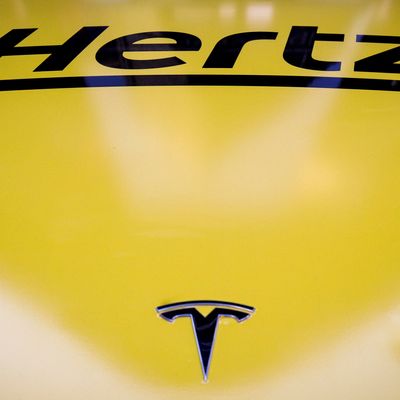
At the start of the year, after Hertz announced it was selling off its fleet of Teslas — backtracking on a plan to buy up 100,000 of the electric vehicles — the news sounded good for Bijay Pandey, a 34-year-old self-employed data worker in Irving, Texas. “I have another vehicle, and I was trying to add one for my wife because gas prices were too high,” he said. When he found out that it came with a $4,000 tax credit — even better. “That’s what attracted me,” he added. So, the day after Valentine’s Day, he bought a red 2022 Long Range Model 3 with 70,000 miles on it. It ended up costing just about $25,000, not a bad deal for a car that can sell for about $47,000 new.
But almost immediately, there were problems. After getting a temporary title, he found the car wasn’t reading voltage correctly. Soon, a body shop found a quarter-size hole in the undercarriage he hadn’t seen before, which led to revelations of deeper issues inside. “The high-voltage battery pack is damaged and could cause extreme safety concerns,” a Tesla technician texted him. Because the hole was “exterior damage,” it wasn’t covered by the warranty, which meant a $13,078.58 repair bill. Hertz said that it would swap the car for Pandey, but for about two months he waited — making $500 payments on his auto loan — before getting a replacement. “I realized why they were trying to get rid of those Teslas,” he said. “If anything happens to a Tesla, then the bill is too high.”
Hertz is an early contender for Wall Street’s schlimazel of the decade, the big unlucky lemon that just can’t seem to get anything right. The run of high-profile disasters began more than four years ago when the rental-car company went into bankruptcy during the early weeks of the pandemic, weighed down by $19 billion in debt and facing a global pause on travel. It sold off its fleet of vehicles to pay back creditors, became one of the first meme stocks, and — thanks to a raging bull market — emerged from bankruptcy in record time.
But that win may have been unlucky in its own way — Hertz was left trying to build back up its fleet during a time when the cost of new vehicles was skyrocketing. In 2021, at the height of the Tesla hype boom, Hertz announced it would make 20 percent of its cars electric — it never got to quite that level, but it did end up buying about 30,000 Teslas. (It bought other EVs, too, but most of the fleet comes from Elon Musk’s company). Since it returned to the public market in 2021, Hertz has lost more than $12 billion in value, and its CEO Stephen Scherr — the former CFO of Goldman Sachs — stepped down.
Hertz’s latest challenge is trying to get out of its entanglement with Tesla. In retrospect, it just looks like a bad idea. Companies like Hertz make money when they rent out cars as often as possible, which means their vehicles will often have more miles than the average vehicle, and, in turn, have more problems that need expensive maintenance. A side deal renting the EVs to Uber drivers — who often have to drive hundreds of miles a day to make a profit — wore down the cars even more, which also weighed down their resale value. Last month, the company announced that it had sold about 10,000 EVs — about a third of the total fleet it intends to offload. At first blush, that looked like Hertz would be ahead of schedule. But the pace of sales is starting to slow. One salesman at a Hertz in Smithtown, New York, told me that sales have dropped from as much as 30 a week in January and February to about five a week in April. Online forums are full of people steering prospective buyers away from Hertz vehicles. One factor may be price. “Hertz does not provide haggling on price,” he said. “It is what it is.”
When Hertz first announced it was selling off most of its EVs, it blamed lower demand among the traveling public than it had expected. “They have an oversupply” of Teslas, said John Plimpton Babcock, an analyst at Bank of America who covers the car-rental company. That lower turnover meant less profit, he added.
It makes sense Hertz would try to sell off its fleet now. Purchases of brand-new EVs are stalling out after a decade or so of stratospheric growth. Auto loans have interest rates starting at about 5 percent and go skyward from there. A shortage of reliable charging stations, and worries about batteries losing power in cold weather, have all hurt public interest in owning — and perhaps even renting — an EV.
In response to questions about its Tesla sales, a Hertz spokeswoman forwarded comments from the company’s CEO, Gil West, that the company expects that the sell-off of the remaining 20,000 EV will be “complete by the end of the year.” The company also said that, as far as Pandey’s car was concerned, “we worked closely with him to deliver a Tesla that met his needs and preference.”






























